高二英语上学期unit1-grammar1
高二英语第1-5单元知识一览表

编写人:李淑芳Unit 1 Art第一部分:词汇1. 重点课标词汇:(8个)aim, typical, adopt, possess, attempt, predict, specific, appeal2. 课标词汇:(37个)evident, coincidence, abstract, faith, figure, aggressive, scholar, flesh, avenue, preference, contemporary, permanent, sculpture, (sculptor,) conventional, superb, technique, shadow, ridiculous, controversial, marble, delicate, carve, café, allergic, exhibition, geometry, bunch, fragile, reputation, civilization, visual, fragrant, Egypt, Egyptian, district, committee, signature第二部分:短语1. 重点课标短语:(5个) a great deal of, on the one hand …on the other hand…., appeal to, focus on,2. 课标短语:(6个)have faith in, take possession of, in the possession of, in possession of, by coincidence, in the flesh,3. 练习册短语:(4个)leave sth. to sb., have a preference for, lie in, admission price,第三部分:句型1. It is / was evident that…2. would rather…3. more than…4. Among the painters… were the impressionists.5. the first person to do sth….第四部分:交际功能:表示偏爱(Preference)1. I’d prefer…2. I’d rather…3. I’d like…4. I want to …5. Which would you prefer,…?6. Would you rather…?7. Would you like… or…?8. Personally, I ’d rather enjoy…9. In my opinion/view, I ’d prefer to…10. As for me, I ’d like … better than…第五部分:语法——虚拟语气(Subjunctive mood)(与第二单元合并)一、定义:二、用法:用在多种从句中。
高中英语unit1Bodylanguage-grammar教案牛津上海版S1A
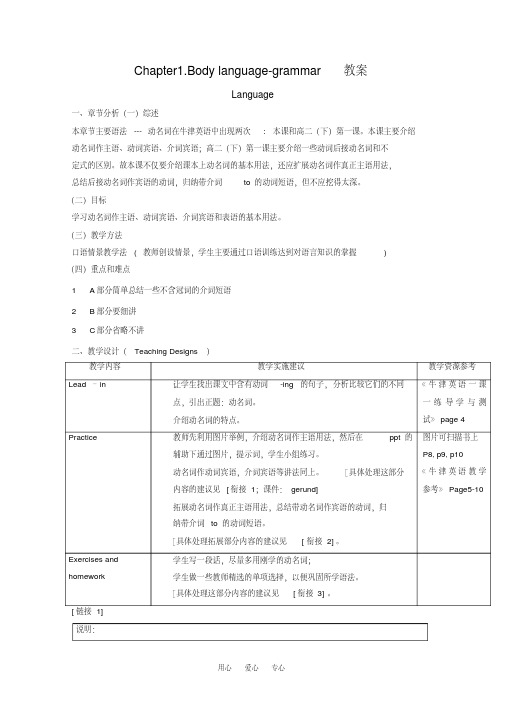
Chapter1.Body language-grammar教案Language一、章节分析(一)综述本章节主要语法---动名词在牛津英语中出现两次: 本课和高二(下)第一课。
本课主要介绍动名词作主语、动词宾语、介词宾语;高二(下)第一课主要介绍一些动词后接动名词和不定式的区别。
故本课不仅要介绍课本上动名词的基本用法,还应扩展动名词作真正主语用法,总结后接动名词作宾语的动词,归纳带介词to的动词短语,但不应挖得太深。
(二)目标学习动名词作主语、动词宾语、介词宾语和表语的基本用法。
(三)教学方法口语情景教学法( 教师创设情景,学生主要通过口语训练达到对语言知识的掌握)(四)重点和难点1A部分简单总结一些不含冠词的介词短语2B部分要细讲3C部分省略不讲二、教学设计(Teaching Designs)教学内容教学实施建议教学资源参考Lead –in 让学生找出课文中含有动词-ing的句子,分析比较它们的不同点,引出正题:动名词。
介绍动名词的特点。
《牛津英语一课一练导学与测试》page 4Practice 教师先利用图片举例,介绍动名词作主语用法,然后在ppt的辅助下通过图片,提示词,学生小组练习。
动名词作动词宾语,介词宾语等讲法同上。
[具体处理这部分内容的建议见[衔接1;课件:gerund]拓展动名词作真正主语用法,总结带动名词作宾语的动词,归纳带介词to的动词短语。
[具体处理拓展部分内容的建议见[衔接2]。
图片可扫描书上P8, p9, p10《牛津英语教学参考》Page5-10Exercises and homework学生写一段话,尽量多用刚学的动名词;学生做一些教师精选的单项选择,以便巩固所学语法。
[具体处理这部分内容的建议见[衔接3]。
[链接1] 说明:这是一份关于动名词的基础教学的教案与课件。
Step One lead-in1Ask students to find the sentences which have the form of v.+ing in the text .(possible answers):He gave an encouraging smile.Communicating is more than speaking and listening.She is holding her head up.2Explain the meaning and features of gerunds.Gerunds are –ing nouns. It is a kind of nouns. So in the above sentences, only“communicating, speaking, and listening” are gerunds. As a noun, gerunds canbe used as subject, verb object, preposition object, predicative and attributive. Step Two Presentation1Gerunds as subjects1)Example:T: What does shaking hands mean?S1: Shaking hands is a sign of friendship.S2: Shaking hands means that you are friendly.(动名词作主语时,位于动词用单数)2)PracticeStudents practise according to the example. They work in pairs. S1 makesquestions using the pictures and turning the verbs in brackets into –ing nouns. S2 chooses answers from the box.Shaking your fist is a sign of anger.Sighing is a sign of sadness.Yawning means that you are sleepy.Closing your eyes means that you are thinking.Whistling means that you are happy.Scratching your head means that you are thinking.Bowing is a sign of respect.(补充讲解句型It is (was) no use/good doing something.)2Gerund as verb objects1)Example:T: I didn’t know you could swim.S: Didn’t you? I love/ like swimming.T: So do I. I really enjoy swimming.I don’t. I hate / dislike swimming.I prefer walking.2)Practice:Students work in pairs to make similar dialogues about the pictures. Followthe example.3)Tell students some other verbs which have such usages.admit, appreciate, avoid, be worth, complete, finish, deny, delay, postpone,escape, practice, suggest, miss, allow, permit, forbid, consider, imagine3Gerunds after prepositionsOn her first day at work, Debbie saw the things. She didn’t know what they werefor, so she asked Mr Yang.Work in pairs to complete their conversation. S2 should answer S1, using –ing nouns made from the verbs in the box along with “for”.1)Example:T: Excuse me, but what are these _keys_____ for?S: They’re _for____ __locking_____ the drawers of the desk.2)Practice:Students work in pairs to make similar dialogues about the pictures. Followthe example.S1: And this _______?S2: It’s _______ ________ letters.S1: What about these _______ ________?S2: They’re _______ ________ your paper together.S1: This ________. What’s it for?S2: It’s _______ _______ the dates on documents.S1: And these ________?S2: They’re _______ ________. They’re a present for your first day at work.( 补充总结含介词to的动词短语:be (get)used to, get down to, look forward to, lead to, pay attention to, be devoted to, object to例如:Let’s get down to talking about your future.I’m look forward to hearing from you.)(见课件:gerund)[链接2]说明:这是动名词的拓展部分,拓展了动名词句型、接动名词做宾语的一些动词、接动名1下列句型后用动名词1)It’s no use / good doing…2)There is no point (in) doing …3)It’s worth doing…4)…can’t help doing…〖典型例句〗1)It’s no use crying over the spilt milk.2)The place is well worth visiting again.3)There is no point cheating in the exam.4)We can’t help laughing at the joke.5)It’s no good copying others’ homework.2下列动词后常接动名词做宾语1)admit, appreciate, avoid2)complete, consider3)delay, deny4)endure/stand, enjoy, escape, excuse5)finish6)imagine7)keep8)mind, miss9)postpone, practice10)resist, risk11)suggest巧记这些动词的诀窍:继续坚持勿停止;盼望完成莫推迟错过成功会后悔;惯于冒险须放弃避免原谅不逃脱;忙于欣赏禁不住介意练习很值得;考虑建议末延迟想象无用已无益;记得做过勿忘记禁止使用不定式〖典型例句〗1)I enjoy reading books in bed though it is not a good habit.2)I can’t imagine going to any place without you.3)Would you mind opening the door for me?4)He suggests reading English every day.5)The bird missed being shot.6)He escaped being punished by running away.3下列动词短语种to为介词1)be (get)used to2)get down to3)look forward to4)pay attention to5)be devoted to6)object to7)lead to〖典型例句〗1)I used to get up late, bu t now I’m used to getting up early.2)After discussing with his deskmate, he got down to writing his composition.3)I’m looking forward to hearing from you.以下几点可以在以后单元里讲解:1)need/ want / require 句型2)love, like, hate 后接 to do 与doing 作宾语的区别3)stop, remember, regret, try, mean, go on, forget后接 to do 与doing 作宾语的区別4)allow, permit, consider, advise后接 to do 与doing 作宾语和宾补的区别5)动名词的时态和语态6)动名词的复合结构[链接3]说明:Ⅰ单选:1.Do keeping _____, will you?A. to tryB. tryC. having triedD. trying2. We are all looking forward ______ Mr. Smith next week.A. to seeB. of seeingC. at seeingD. to seeing3. He spent all his time ______ for the final examination.A. to prepareB. of preparingC. in preparingD. to preparing4. The boy is only five years old, but he is quite used _____ the telephone.A. to answerB. to answeringC. of answeringD. by answering5. ______soundly is better for your illness than taking medicine.A. To sleepB. SleepingC. SleepD. Having slept6. Sometimes when I look into the sky, I feel like ______ a trip somewhere.A. to makeB. makingC. makeD. to go for7. I consider _____ of every fish is a kind of murder.A. takingB. a takingC. the takingD. to take8. My grandfather is a rich man, but ______ money does not solve all his problems.A. hasB. to haveC. havingD. having had9. It is no good ______ him to see you off.A. to expectB. expectingC. of expectingD. for him to expect10.There is one more book worth ______.A. readB. of readingC. being readD. reading11.He liked ______ many questions at the press conference.A. being askedB. askingC. of askingD. ask12.We had no trouble ______ the path through the forest.A. to findB. for findingC. findingD. with findingII.用括号里的动词的正确形式填空:1. He insisted on _______(do )the work in some other way.2. The windows want / need / require to be cleaned. That is, they need / want / require_____ (clean).3. He practiced _______(play) the piano every day.4. She doesn’t mind ______( work ) overtime.5. It will mean ______( benefit ) your company and mine.6. Have you decided to put off ______( go ) to the seaside?7. Peter kept (on) ______ (ask) questions.8. It’s a waste of time ______( argue) about it.9. _____ ( talk ) is easier than doing.10. Have you finished _______ (do) your homework?III.翻译:1. ______(每天晨读一刻钟)is very important in learning English.2. It’s no use _______(叹气).3. Debbie enjoys _______(微笑着与客户交流).4. John has just given up ______(吸烟).5. I ______(一直盼望着访问)China again.6. He run off to avoid ______(看见)by his class teacher.7. This machine is for ______(切纸).8. This book is well worth ______(读).9. ______(挥动拳头)is a sign of anger.10. Mr. Yang suggested/advised ______ (看着顾客的眼睛)to make a good impression on him.IV.拓展题:1.---You were brave enough to raise objections at the meeting.---Well, now I regret _____that.A. to doB. to be doingC. to have doneD. having done2.The patient was warned _____ oily food after the operation.A. to eat notB. eating notC. not to eatD. not eating3.She looks forward every spring to _____ the flower-lined garden.A. visitB. paying a visitC. walk inD. walking in4.The little time we have together we try _____ wisely.A. spending itB. to spend itC. to spendD. spending that5.While shopping, people sometimes can’t help ______ into buying something they don’t really need.A. to persuadeB. persuading D. being persuaded D. be persuaded6.What worried the child most was ______ to visit his mother in the hospital.A. his not allowingB. his not being allowedC. his being not allowedD. having not been allowed7.Tony was very unhappy for _____ to the party.A. having not been invitedB. not having invitedC. having not invitedD. not having been invited8._____ to sunlight for too much t ime will do harm to one’s skin.A. ExposedB. Having exposedC. Being exposedD. After being exposed9.The discovery of new evidence led to _____.A. the thief having caughtB. catch the thiefC. the thief being caughtD. the thief to be caught10.One learns a language by making mistakes and _____ them.A. correctB. correctingC. correctsD. to correct11.---You should have thanked her before you left.---I meant _____, but when I was leaving I couldn’t find her anywhere.A. to doB. toC. doingD. doing12.In some parts of London, missing a bus means_____ for another hour.A. waitingB. to waitC. waitD. to be waiting13.---What’s made John so angry?---______ the tickets for the concert.A. LoseB. To loseC. Because of losingD. Losing14. The day we are looking forward to _______ at last.A. arrivingB. arriveC. arrived D. arrives15. Mr. Reed made up his mind to devote all he had to ____ some schools for poor children.A. set upB. setting upC. have set upD. having set up附答案:Ⅰ.单选:DDCBBBCCBDBCⅡ.用括号里的动词的正确形式填空:doing, cleaning, playing, working, benefiting,going, asking, arguing, Talking, doing Ⅲ.翻译:1.Reading for a quarter of an hour every morning2.sighingmunicating with customers with a smile4.smoking5.am looking forward to visiting6.being seen7.cutting up paper8.reading9.Shaking one’s fist10.looking at customers’ eyesⅣ.拓展题:DCDBD BDCCB BADCB。
高二上学期英语人教版(2019)选择性必修第一二册词性转换清单

高二英语校本资料词性转换(选择性必修一&二)class________________name________________number________________选择性必修一Unit1 People of Achievement词性转换1.crucial adj.至关重要的,关键性的→crucially adv. 至关重要地2.vital adj. 必不可少的,极其重要的→vitally adv.极其;绝对3 mit vt. vi 承诺,保证,全心全意投入→mitment n.承诺,奉献→mitted adj. 尽心尽力的,坚定的4.academy n.专科院校→academic adj. 学业的,学术的5.object n.物体,宾语→object vt.反对,不赞成→objection n.不赞成,反对→objective n.目标,目的→objective adj客观的6.value n.价值→valuable adj.有价值的→invaluable adj.价值连城的→valueless adj.一文不值的→evaluate vt.评估,估价→evaluation n.评价,评估7.distinct adj.清晰的,清楚的,有区别的→distinguish vt.区别,辨别→distinction n.区别,差别,卓越,特点→distinctive adj.独特的,特别的,有特色的8.extract n.提取物,摘录→extract vt.提取,提炼,摘录9.boil n.沸腾,沸点→boil vt. vi 沸腾,煮开10.liquid n.液体→liquid adj. 液态的,液体的11.acknowledge vt.承认,感谢→acknowledg(e)ment n.承认,确认,感谢12.defeat n.失败,挫败→defeat vt. 击败,战胜→defeated adj. 有挫败感的13.analyze /analyse v.分析→analysis n.分析/ analyses (n.) 复数14.apparent adj. 显然的,表面上的→apparently adv. 显而易见,显然15.science n.科学→scientist n.科学家→scientific adj. 科学上的,关于科学的16.most adj.大部分的→mostly adv.主要地;通常17.conclude vt.vi结束,推断出→conclusion n.结束,结论→conclusive18.novel n.小说adj. 新颖的→novelist n.小说家19.foundation n. 根基,基础→found(founded, founded)vt.创建,建立→founder n.创办者20.inference n.推论,推理,推断→infer (inferred, inferred )vt.推断,推定21.politics n.政治学→politician n.政治家→political adj.政治的,政党的22.number n. 数字→numerous adj.众多的,许多的23.theory n. 理论→theoretical adj.理论的24.relate vt. 关系,联系→relation n.关系,亲戚→ relationship n关系→.relativity n. 相对论→relative adj. 有关的n. 亲戚→relevant adj. 相关的25.gentleman n.绅士→gentle adj.温和,文雅的→gently adv.轻轻地,温柔地26.patent n. 专利,专利证书→patent adj. 有专利的,受专利保护的27.passion n.酷爱,激情→passionate adj. 热情的,狂热的28.doctor n. 医生,博士→doctorate n.博士学位29.extraordinary adj.不一般的,非凡的→extraordinarily adv.非常地,格外地30.gradual adj.逐渐的,逐步的→gradually adv.逐渐地31.institution n.社会公共机构→institute n.(教育、专业)机构,机构建筑→institutional adj.机构的,慈善机构的32.consequence n.结果,后果→consequent adj. 随之而来的,作为后果的→adv.consequently因此,所以33. peculiarity n.个性,特点,怪异的性质→peculiar adj.特有的,怪异的,不舒服的34.counter n.(能遇见顾客的商店、银行)柜台,计算器→encounter n.遇见,邂逅,遭遇→encounter vt.遇到,碰到35.profession n.职业,行业→professor n.教授→professional adj.职业的,专业的→professionally adv.专业地,职业地36. mourning n.哀悼,忧伤→mourn v. 哀悼,忧伤37.remark n.谈论,评论,引人注目,显耀→remark vt.评论,说起,谈论→remarkable adj.非凡的,显著的38.summary n.总结,概括,概要→summarize vt.总结,概括39.draft n.草稿,草案→draft vt.起草,草拟选择性必修一Unit2 Looking into the Future词性转换1. persuade vt. 说服,劝说→persuasion n.说服→persuasive adj. 有说服力的2.distant adj. 遥远的→distance n.距离3.secure adj.安全的,有把握的→secure v. 获得;保护→security n.安全;保护措施4.automatic→ automatically adv. 自动地→automation n. 自动化5.integrate vt. 整合,合并→integrated adj. 综合的→integration n. 整合6. sense n.感觉→sensor n.传感器→sensory adj.感觉的,感官的7.effect n. 效应,影响,结果→affect v. 影响→effective adj.有效的→efficient adj. 效率高的→ efficiency n.效率,功效8.prefer vt. 宁愿,更喜欢→preference n.喜爱,偏爱9.instant adj. 即可,立即→instantly adv. 立即,马上→instance n.例子,举例10 mand n.命令,指令,控制→mand vt. 命令,控制→manding adj.权威的,威严的11.obey vt. 服从→disobey vt.不服从12.warn vt. 警告→waning n.警告13. constant adj. 连续不断的→constant n. 常数,常量→constantly adv. 连续地14. .normal adj.正常的,精神健全的→abnormal adj.反常的→normally adv. 正常地, 通常15.critical adj.严重的,关键的,批判的→critically adv.批判地; 严重地→criticize16.potential n.潜力, 可能性→potential adj.可能的, 潜在的→potentially adv. 可能地, 潜在地17.leak n.漏洞, 裂缝→leak vt. 渗漏, 透露18. electricity n. 电, 电流→electric adj. 电的,电动的→electrical adj. 与电有关的→ electronic adj.电子的19.wire n.电线, 金属线→wire vt.接通电源→wiring n.电线线路→wireless20.detect vt. 发现, 查明→detection n. 侦查→ detective n.侦探→detector21.relate vt. 关系,联系→relation n.关系,亲戚→relationship n关系→ relativity n相对论→relative adj. 有关的→relevant adj. 相关的22. fantasy n.幻想,想象→fantastic adj.棒极了,富于想象的23.innovate→innovation n.创新,改革→innovative adj. 革新的,创新的24. available adj.可获得的;有空的→availability25.structure n.结构,体系→structure vt系统安排,静心组织→structural26.crime n.犯罪活动,不法行为→criminal n.罪犯→criminal adj.犯罪的27 bine vt. 结合,混合→bination n. 结合,联合,混合体28.predict vt.预测,预料→ prediction n.预言,预测29.forecast n.预测,预报→forecast vt.预测,预报30.occupy vt. 占用,占领,忙碌→occupied adj.已被占的,忙的→occupation n.职业31.oppose vt.反对;抵制→opposed adj.反对的;截然相反的→opposition32.cease vt.停止,终止→deceased adj. 已死的,亡故的33.absence n.不存在,缺席→absent adj.缺席的,不存在的→present adj.出席的;在场的34.advocate n.提倡者, 拥护者支持者→advocate vt提倡, 支持, 拥护35. emphasis n.强调, 重视,重要性→emphasize vt强调, 重视, 着重36.luxury→luxurious37.prospect n.前景;可能性→prospective adj.有望的;可能的38.resist vt抵制, 反抗→resistance n.抵制, 反对, 抗拒→resistant39.accurate adj.精确的, 准确的→accurately adv. 精确地→accuracy n.精准性,精确性40. library n.图书馆→librarian n.图书馆馆长,图书管理员选择性必修一Unit3 Fascinating Parks词性转换1.adoption n.采用,收养→adopt vt. 采纳;采用;收养.→adopted adj.被采用的,被收养的2.reward n. 酬谢,赏金→reward vt. 酬谢,报答→rewarding adj.值得做的,报酬高的3.adore vt.崇拜,敬仰→adorable adj.可爱的4.amuse vt. 给......娱乐(和消遣)→amused adj.逗乐的,觉得好笑的→amusingadj.逗人发笑的,令人发笑的→amusement n.娱乐,消遣5.rare adj.稀少的,罕有的→rarely adv. 很少地,罕有地6.swing vt. 摆动,摇摆→swung vt.(过去式)→swung vt.(过去分词)7.vision n.视力,视觉→visible adj.可看的见的,显而易见的→invisible adj.看不见的,隐形的8.blessing n.祝福,恩宠→bless vt.保佑→blessed adj. 幸福的,有幸得到,神圣的9.appeal n. 吸引力,呼吁,上诉→appeal vt.吸引,呼吁→appealing adj.有吸引力的10.prohibition n.禁令;阻止;禁止→prohibit vt.(尤指以法令)禁止;阻止11.ban n.禁令→ban 明令禁止,取缔12.journey n.旅行→journal n.日志,刊物→journalist n.记者13.cycle n.自行车,循环→cyclist n.骑自行车的人→cycle vt.骑自行车14.fashion n.时尚,时兴→fashionable adj.时尚的,流行的→fashionably adv.时髦地,流行地15.entertainment n.娱乐,招待,娱乐活动→entertain vt.招待,款待,娱乐→entertaining,有趣的,使人愉快的16.incredible adj.难以置信的→incredibly adv.难以置信地,极其17.acpany, 陪伴, 伴随,(尤指用钢琴)为…伴奏→pany n.公司,陪伴18.wander n.游荡,流浪,闲逛vi. & vt. 闲逛,漫游,走神,离散→wonder v. 想知道,想弄明白n.奇迹,奇观,奇妙之处选择性必修一Unit4 Body Language词性转换1.variety n.种类→vary vt.变化,使多样化→various adj. 各种各样的2.appropriate adj.合适的,恰当的→inappropriately adj.不恰当的,不适当的3.approval n.赞同,批准→approve vt.赞同,批准→approving adj.赞成的,同意的→disapproval n.不赞同,不批准→disapprove vt.不赞同,不批准4.demonstration n.游行示威,演示,证明→demonstrate vt.表达,表现,说明5.employment n.工作,雇佣→employ vt.使用,应用,雇佣→unemployed adj.失业的,待业的6.identification n.身份→identify vt.辨认→identity n.确定, 鉴定, 识别, 身份证明→identical adj.相同的7.interpretation n.诠释,解释→interpret vt.诠释,解释,翻译→interpreter n.翻译官8.difference n.不同,差异→differ vt.不同,相异→different adj. 不同的9 parison n.比较,比拟→pare vt.比较,比作10.favour n.恩惠,照顾→favour vt.支持,偏袒→favorable adj.赞成的,有利的11.anger n.怒气,愤怒→angry adj. 生气的,愤怒的→angrily12.rely vt.依靠,依赖→reliable adj.可靠的13. slight adj.轻微的, 微小的→slightly adv.稍微轻微地14.verba l adj.口头的, 语言的→nonverbal adj. 非语言的15.assessment n.评价, 评定→assess vt.评估,评定16. internal adj内部的, 里面的→external adj外部的, 外面的17.straight adj.笔直的, 直的→straighten vi把......弄直, 挺直18.pose n.姿势vi摆好姿势vt.造成(威胁问题)→posture n.(坐立的)姿势,看法,立场19.bend→bent→bent vt.vi.弯曲,倾斜(原型,过去式及过去分词)20.clarification n.澄清,说明→clarify vt.阐明,澄清cation n.教育→educate vt.教育→educated adj.教育的→educator n.教育家22.tendency n.趋向,倾向→tend vt.往往是;照顾→trend n.潮流,趋势→intend v→intention n.打算,计划,目的23.implication n.含义,暗示→imply vt.意味着,暗示24.occupation n.职业,占领→occupy vt.占用,占领,使忙碌→occupied adj.已被占的,忙的25.distraction n.分散注意力的事情→distract vt.分散注意力→attract vt.吸引→attraction n.吸引→attractive adj.吸引人的26.distinguish vt.区别,辨别→distinguished adj.卓越的,尊贵的→ distinction n.区别,差别,卓越,特点→distinct adj.清晰的,清楚的,有区别的→distinctive adj.独特的,特别的27.anxiety n.焦虑→anxious adj.焦虑的28.embarrassment n.尴尬,窘迫→embarrass vt.使尴尬,使难为情→embarrassed adj.尴尬的,难为情的→embarrassing adj.令人尴尬的,令人难为情的29.shame n.羞耻,羞愧,惭愧→ashamed adj.感到羞耻的→shameful adj.可耻的,丢脸的30.weep →wept →wept vt.&vi.哭泣(原型,过去式及过去分词)31.inquiry/enquiry n.询问,咨询,调查,探究,查究→inquire/enquire vt.咨询,调查,探究32.adjustment.调节→adjust vt.改编,适应,调节→adapt vt.适应(新情况),改编→adaptation n.改编本,适应33.reaction n.反应→react v→action n.行为,行动→act v→active adj.积极的,活跃的选择性必修一Unit5 Working the land词性转换1.devotion n. 献身,奉献,忠诚→devote vt.为….付出时间;努力;金钱等→devoted adj. 献身的;专心致志的;忠实的2. shortage n.不足,缺少→short adj.短缺的,短的→shorten vt.使变短,缩短3.crisis n.危及, 危急关头→crises n. 危及, 危急关头(复数)4.yield n.产量, 产出→yield vt.出产(作物),产生效益,收益→yield vi 屈服,让步5.convince vt.使确幸,使相信→convincing adj.令人信服的→convinced adj.确信的6.characteristic n.特征,特点,品质→characterize vt描述,是....的特征→characteristic adj.典型的,独特的7.attain vt.(通过努力获得),得到→attainable adj.可达到的,可得到的8.convention n. 习俗,惯例→conventional adj.常规的,传统的9. pollination n.传粉,授粉→pollinate vt.传粉,授粉10.assumption n. 假定,设定,(责任)的承担,(权力)的获得→assume vt. 假设,承担11.intensity n.强烈; 紧张; 剧烈; 强度; 烈度;→intense adj.强烈的,激烈的→intensive adj. 密集的,彻底的,细致的12.overe vt. →overcame vt→overe vt 克服,解决,战胜(原形, 过去式, 过去分词)13.expansion n.扩大,扩张,扩充→expand vt.vi扩展,发展(业务)14.output n.产量,输出,输出量→output vt输出→output vt输出(过去式)→output vt 输出(过去分词)15.assumption n.估计,估算→assume vt.估计,估价,估算16.consumption n.消耗(量),消费(量)→consume vt.消耗,消费17.generation n.代,一代→generate vt 产生,引起18.vision n.视力,视觉→envision vt.展望,想象→visible adj.可看见的,显而易见的→invisible adj.看不见的,隐形的19.reality n. 现实→realize vt 实现→real adj.真实的→really adv真实地20.salt n. 盐→salty adj.含盐的,咸的21.expansion n.扩建部分,扩大→expand vt延长22. chemist n.药剂家,化学家→chemistry n. 化学→chemical adj.化学的,和化学有关的23.nutrition n.营养,滋养→nutritious adj.有营养的,营养丰富的→nutritional adj.营养(物)的24.alleviate n.减轻;缓解;缓和;镇痛物;→alleviation vt 减轻,减缓25.poverty n.贫穷,贫困→poor adj.穷困的→poorly adv 穷困地;糟糕地an n.器官,管风琴→organic adj.有机的27.bacterium n.细菌(单数)→bacteria n.细菌(复数)28.digestion n.消化→digest vt.vi消化,领会,领悟→digest n. 摘要, 文摘29.essential adj. 完全必要的,重要的,本质的→essentially adv 本质上, 根本上, 基本上30.mine n矿藏,矿山→mine vt 开采矿物→mineral n. 矿物,矿物质31.alternation n 交替→alter vt (使)交替,(使)轮流→alternative n.可供选择的事物→alternative adj.可供代替的,非传统的32.instance n.例子,实例→instant adj.立刻,马上→instantly adv 立刻,马上33.depth n.深度→deep adj.深的→deeply adv深深地34.entire adj. 完全,整个→entirely adv 完全地,整个地选择性必修二Unit1 Science and Scientists词性转换1.severe adj.严重的额,严厉的→severely adv. 严重地,严厉地,严格地2. frustrated adj. 懊恼的,沮丧的,失意的→frustrate v.使懊恼,使沮丧3. contradiction n.矛盾,对立,反驳→contradictory adj. 相互矛盾的,对立的4. infection n.传染,感染→infectious adj.有传染性的,可传染的→infect v.使感染,传染5.subscription n.订阅,资助,定期捐款,捐助→subscribe v.订购股份,定期订购,定期缴纳(会费)6. proof n.证据,证明,检验→prove v.证明,验证7. multiplication → multiple adj.数量多的,多种多样的→multiply v.成倍增长,乘,繁殖8. pump n.泵,抽水机,打水桶→pump v.用泵输送,输出9.suspect→suspicious adj.怀疑的,可疑的→suspiciously adv.可疑地→suspect v.怀疑,不信任10.blame n.责备,指责→blame…..归咎于,责怪,指责11. handle n.把手,手柄→handle v.处理,操纵12. intervention n.干涉,干预,介于→intervene v.干预,介入,干扰13. link n.纽带,关系→link…..连接起来,相关联14. pure adj.干净的,纯的→purely adv.仅仅,完全→purify v.净化15.substantial adj.大量的,重大的→substantially adv.大量地,客观地16. decrease n.减少,降低,减少量→decrease v.减少,降低17. transformation n.转型,改革→transform vi.改变,转变18. epidemic →epidemiology→epidemic adj.流行的,盛行的19.thought n.见解,思考,思维,思想→thinking n.思想,思维,见解→thinker n. 思想者,思考者→thoughtful adj.深思的,体贴的→think v. 想, 考虑20.initial adj.最初的,开始的→initially adv.开始,最初,起初21.theory →theoretical22. solid→solid adj.可靠的,固体的,坚固的(consolidate vt.使巩固;使加强)23. concrete →concrete adj.混凝土制的,确实的,具体的24. patriotic→patriotically adv.爱国地→patriotism25. mechanic n. 机械师,机械修理工→mechanical adj.机械的,发动机的,机器的26. defense/defence →defensive→defend27. assistance→assistant →assist28.trace n.痕迹,遗迹,踪迹→trace v.追溯,追踪,查出29. gift n.礼物,天赋→gifted30. abstract→abstract adj.抽象的,理性的31.steady adj.稳定的,平稳的→steadily adv.稳定地,不断地,平稳地32. astronomer→astronomy→astronaut33. scope n.(题目、组织、活动等的)范围; (做或实现某事的)机会,能力; …镜(观察仪器); →microscope →telescope34. shift n.改变,转换,轮班→shift v.转移,挪动,转向35. vivid adj.生动的,鲜明的→vividly adv.生动地选择性必修二Unit 2 Bridging Cultures词性转换1.plex adj.复杂的;难懂的→plexity n.复杂性;复杂之处2.qualification n.资格→qualified adj.有传资格的,可资历的→qualify v.资格3.ambition n.野心,报复→ambitious adj.有野心的,有雄心的4.adaptation n.适应;改编本→adapt5.fort n.安慰,舒适→fort v.安慰,舒适→fortable adj.舒适的→fortably舒适地6.participation n.参加, 参与→participant n.参与者→participate v.参加, 参与7.presentation n.介绍, 陈诉, 报告→present v.陈述,提出(观点,计划),呈现8.engage v.参加, 参与, 吸引…..的注意→engagement n.订婚,约会,战斗,雇佣9.involve v.包括, 涉及, 参与→involvement n.卷入, 牵连, 参与→involvedadj.涉及的, 牵连的10.messenger n. 送信人,信使→message n.信息11.edition n. 一期,一辑,版次→edit v.编辑,主编,剪辑→editor n.编辑12.overwhelming adj.无法抗拒的,巨大的→overwhelm(感情或感觉)充溢,压倒;击败; 征服→overwhelmed adj. 使不知所措,使难以承受13.homesickness n. 思乡病,乡愁→homesick adj.思乡的; 想家的; 患怀乡病的;14.motivation n. 动力,积极性,动机→motivated adj.积极地,主动的,→motivate v. 成为….的动机,激发,激励15.advisor/adviser n.顾问→advice n.劝告,建议→advise v.劝告,建议16.reasonable adj.合情合理的→reason n.道理,理由17.expectation n.预料,期待,期望→expect v.预料,期待,期望18.applicant n.申请人→apply v. 申请,施用,使用→application n.申请;应用,施用19.firm n.公司,事务所,商行→firm adj.结实的,牢固的,坚定的→firmly adv.坚固地,坚定地20.exposure n.接触,体验,暴露,揭露→expose v.使接触,使体验21.departure n.离开,出发,背离,违背→depart v.离开22.setting n.环境,背景→set n. 一副,一套→setsetset v.放置,放下,以…..为背景23.dramatic adj.戏剧的, 戏剧性的→drama n.戏剧, 戏剧艺术24.expense n.费用→expensive adj.昂贵的25.tremendous adj.巨大的,极大的→tremendously adv.极大地,巨大地26.behave v.行为, 表现→behaviour n.行为, 举止27.surroundings n. 环境, 周围的事物→surrounding adj.周围的, 附近的28.depressed adj.沮丧的, 意志消沉的→depress v.使沮丧, 使忧愁→depressionn.抑郁, 沮丧, 消沉29.boom n.迅速发展,繁荣→boom v.迅速发展,繁荣30.strengthen v.增强→strength n.力量,力气,长处→ strong adj.健壮的31.optimistic adj.乐观的→optimism n.乐观主义32.gain n.好处,增加→gain v.赢的,获得,增加,取得33.petence n.能力,胜任,本领→petent adj.又能力的,称职的→petition n.比赛,竞争→petitor n.比赛者,竞争者→petitive adj.竞争的→pete v.比赛,竞争34.cooperate v.合作,写作,配合→cooperation n.合作→cooperative adj.合作的,同心协力的35.initiate →initiation n.创始,开始→initial adj.开始的,最初的36.sincerely adv.真诚地,真挚地→sincere adj.真诚地,真挚的→sincerity n.真诚37.logical adj.合乎逻辑的,合情合理的→logic n.逻辑,思维方式选择性必修二Unit 3 Food and Culture词性转换1.prior adj.先前的;优先的→priority2.consist v.由...组成→consistent→consistency n.一致性,连贯性3.elegant adj. 优雅的→elegantly adv.优雅地→elegance4.exceptional adj. 特别的,非凡的→exception n.例外→except prep. 除.....之外5.minimum n.最小值→minimum adj. 最低限度,最小的6.consume v. 消耗→consumer n. 消费者→consumption n.消费量,消耗量7.vegetarian n. 素食者→vegetable8.stable adj. 稳定的,稳重的→stably adv.稳定地,稳重地→stability n 稳定性9.association n.联系,社团→associate v. 联系→associated10.regardless adv.不管,不顾→regard v.尊敬,视为,看做→regarding prep. 关于,至于11.dairy n.乳制品→dairy adj.奶制的,乳业的12.moderation n.适度,合理→moderate adj.适中的,适量的→moderately13.ideal n.理想,完美的人→ideal adj. 完美的,理想的,想象的14.fundamental n基本规律,根本法则→fundamental adj. 基本的,基础的,根本的→fundamentally adv.根本上,基本上15.chew n.咀嚼→chew v. 咀嚼,嚼碎16.modest adj.谦虚的,朴素的→modestly adv.谨慎地,切勿浪费→modesty n.谦虚,谦逊,朴素17.trick n.诀窍,把戏→tricky adj. 狡猾的,诡计多端的,棘手的18.overall adj.全面的,综合的→overall adv.总体上,大致上选择性必修二Unit4 Journey Across a Vast Land词性转换1. craft n. 手艺,工艺→craftsman n.工匠,手艺人→craftsmanship n.手艺,技艺2. antique n. 古董,古玩→antique adj. 古老的,古董的3. pleasure n.快乐→pleased adj.感到高兴的→pleasing adj.令人高兴的,令人满意的→pleasant adj. 令人愉快的,宜人的→please vt. 使喜欢,取悦4. mass n. 团,块,堆,大量→massive adj. 巨大的,非常严重的5. literal adj. 字面意义的→literally adv. 字面上,真正地6. breath n. 呼吸,气息→breathe vi. 呼吸7. scenery n. 风景,景色→scene n. 场景,场面,现场8. spectacular n. 壮丽的场面,精彩的表演→spectacular adj. 壮观的,壮丽的,惊人的9. highlight n. 最好或者最精彩的部分→highlight vt. 突出,强调,使醒目10. drill n. 钻孔,训练,练习→drill vi/vt. 钻孔,打眼11. freeze vt. 结冰→freezing adj. 冰冻的,严寒的→frozen adj. 冰冻的12. anticipation n. 预期,预料→anticipate vt. 预料,遇见,期望13. thunder n. 雷声,隆隆响→thunder vt. 打雷,隆隆作响→thunderous adj. 雷鸣般的14. frost n. 霜,寒冷天气,霜冻→frost vi. 结霜→frosty adj. 有霜的15. during prep. 在….期间,在….过程中→duration n. 持续时间,期间16. enroll v. 加入,注册,登记→enrollment n. 登记,入伍17. idiom n. 习语,成语→idiomatic adj. 地道的,符合语言习惯的18. contrary n. 相反的事实(或事情)→contrary adj. 相反的,对立的19. alongside prep. 在…旁边,与……一起→alongside adv. 在旁边20. process n. 过程→procedure n. 步骤,过程→proceed vi. 行进,继续做21. shore n. 岸→ashore adv. 向(或者)在岸上,向(或者)在陆地22. astonish v. 使十分惊讶,使吃惊→astonishment n. 惊讶→astonished adj. 感到十分惊讶,吃惊→astonishing adj. 令人惊讶的23. mist n. 薄雾,水汽→misty adj.多雾的,模糊的24. advertisement n. 广告,启事→advertise v. 做广告25. photographer n. 摄影师,拍照者→photograph n. 照片,相片→photography n. 摄影26. toast n. 烤面包片,吐司,干杯→toast v. 烤(面包),为…..干杯27.coherence n. 连贯性,条理性→coherent adj. 有条理的,清楚易懂的→coherently adv. 连贯地,条理清楚地选择性必修二Unit5 First Aid词性转换1.minority n. 少数名族→minor adj.次要的→major2.electricity n.电,电流→electric ,电动的→electrical adj.电的,与电有关的→electronic adj. 电子的3.swell vi. 肿胀→swelled vi肿胀(过去式) →swollen/ swelled vi肿胀(过去分词)4.nerve n.神经→nervous adj.紧张的→nervousness n. 紧张不安(名词)5.loose adj.稀松的,松散的→loosely adv.稀松地,松散地→loosen vt. 使松散6.urge n.强烈愿望,迫切要求→urge vt.催促→urgent adj.紧急的,迫切的→urgently adv.迫切地→urgency n.紧迫性,迫切性7.ease n.轻松,容易→easy adj.轻松的,容易地,舒适的→easily adv. 容易地,轻松地8.bath n.洗澡→bathe vt.洗澡,沐浴9.slip n.滑动,滑倒→slip vi滑到,滑落,溜走→slipper n. 拖鞋10. elder n.年长者,前辈,老人→elderly adj. 年长的11. operation n. 操作,手术→operate vi工作,运转/vt 操作→operator n.接线员,操作员12.delay n.延误,耽搁→delay vi 推迟,延期/vt延误,耽搁13.drowning n.溺水→drown vt/vi 溺死,淹没, 沉浸于14.blood n. 血液→bleed vt/vi 流血→bled vi流血(过去式) →bled vi流血(过去分词)→bleeding adj. 流血的15.panic n.惊恐,恐慌→panic vt/vi (使)惊慌→panicked vt/vi (使)惊慌(过去式/过去分词→panicky adj. 焦虑不安的,惊慌的16. interruption n.中断→interrupt vt打断17. scream n.尖叫→scream vt/vi 高声喊,大声叫18. fellow n.家伙,同事,同辈→fellow adj.同类的,同事的,同伴的19.desperation n.绝望→desperate adj.绝望的→desperately20. slap n.(用手掌)拍击声→slap vt(用手掌)拍,打21. practice n实践,练习→practise/practice vt实践,练习→practical adj 实际的,实践的,实用的22. obstruction n.阻碍,堵塞,阻塞物→obstruct vt 阻碍,阻塞,阻挡23.grab n.抓取,抢夺→grab vt抓住,摄取24.tight adj.(控制)严格的,严密的→tightly adv. 紧紧地,坚固地,牢固地25.motion n. 运动,移动→motion vi做动作,示意→motionless adj.一动不动,禁止的26.justice n.正义,公正,司法→justify vt证明.....有道理,为.....辩护27. mist n. 雾→misty adj. 有雾的。
译林版高中英语选择性必修二Unit1 Grammar and usage 练习(雅礼版)

选择性必修二Unit 1 The mass media语法补充练习:过去完成时一、过去完成时的应用1.与过去完成时连用的时间状语可以多种多样,使用它的主要依据是看其是否发生在“过去的过去”。
在来这儿之前我学过一些英语。
I had learned some English before I came here.到去年他已经写了三篇故事。
He had written three stories by the end of last year.当他到那儿时,我们已经把房子弄干净了。
We had cleaned the house when he got there. 2.过去完成时还经常用于主句为过去时的宾语从句中。
他说他当过兵。
He said he had been a soldier.3. 动词expect, hope, suppose, think, want等的过去完成时可用来表示未实现的计划、打算或希望。
我本希望来看你。
I had hoped to visit you, but...他本想在北京买栋房子。
He had meant to buy a house in Beijing, but ...4.用于下列4个特殊句型中:1)hardly … when … , / no sooner … than …2)It/ That /This was the first time that …3)It was+时间段+since …4)… than sb. had thought /expected /hoped /wanted等。
我刚开开门,他就告诉了我。
Hardly had I opened the door when he told me the news.他刚买了这辆车,转眼又卖了。
No sooner had he bought the car than he sold it.这是他第二次和她一道出去。
外研版2019高中英语必修第一册Unit1 using language语法

a He was friendly. b The exam made me quite nervous. c I passed him a book. d She agreed. e He wrote a long letter. f He talked loudly. g She looked after her sister patiently.
buy sb sth, bring sb sth, give sb sth, lend sb sth, tell sb sth, show sb sth, send sb sth, teach sb sth……
【注意】 间接宾语前加上介词to/for,可将其放在直接宾语后面。 如:He gives a pen to me.
Jay Chou is a famous singer. (名词)
He likes singing best. (代词)
※ The young show great interest in his music.
(The+adj.作名词)
※ What he really needs is a cup of bubble tea.
I am crying.
谓语是主语所做的动作。这种句型的动词是不及物动词(即该 动作可以独立发生,不牵涉到别的人或物。动词后不可以直接 接宾语,本身句子意思已经完整)。常见的不及物动词有:work, jump, arrive, come, disappear, cry, happen, die等。
考1 主语(subject) 【句子说明的人或事物】
※3. I found it interesting to learn English. (形式宾语)
英语:必修2 Unit1 Tales of the unexplained-Grammar课件(译林牛津版)

√ √ √ √ √ √ √ √ √ √
√ √ √ √ √ √
√
•The boys are tired. They have just played ________________ (just play) a ball game. 过去的动作 : The boys played a ball game. 对现在的影响: The boys are tired.
Mavis started waiting . Kelly arrives.
wait
an hour ago
now
future
3.现在完成时和现在完 3.现在完成时和现在完 成进行时的比较
比较一: 比较一: has read • Tom __________ (read) a book about Stonehenge. (She finished reading the book.) has been reading • Tom ________________ (read) a book about Stonehenge. (She is still reading the book.)
broadcasted
broad4
now
future
小结: 小结:
现在完成进行时用法2: 现在完成进行时用法2:
现在完成进行时表示过去的动作持续到说话时刚结束。 现在完成进行时表示过去的动作持续到说话时刚结束。 Kelly: Sorry I’m late. Have you been waiting long? Mavis: Yes. I’ve been waiting for an hour.
小结: 小结:
现在完成时用法1---已完成 已完成、 现在完成时用法1---已完成、影响性用法
Unit 1 Lesson1 lifestyles grammar(教学课件)-高中英语北师大版

4. It usually takes me 20 minutes to get home by bus.
Object(宾语)
1. I do know I need to drag myself away from the online world.
Predicative(表语)
1. My aim is to do well in every subject this term.
2. My target is to prepare myself for my degree in biology at university.
Attribute(定语)
1. It is so convenient for Joe to compare the quality and prices from different online shops.
2. Joe’s mum keeps telling him to go out with his school friends instead.
5. Li Ying is the first person to join the volunteering
attribute 定语
club in her class.
Find more sentences in the text with “to do” structure and identify their functions!
c
Homework
Discuss your ideal lifestyle with a partner by using “to do” structure.
高二英语人教版选修六讲义Unit1SectionⅢGrammar虚拟语气(1)
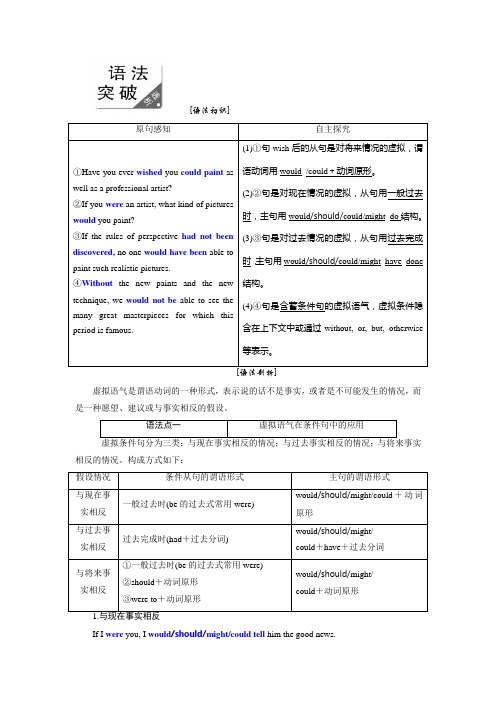
[语法初识]原句感知自主探究①Have you ever wished you could paint as well as a professional artist?②If you were an artist, what kind of pictures would you paint?③If the rules of perspective had not been discovered, no one would have been able to paint such realistic pictures.④Without the new paints and the new technique, we would not be able to see the many great masterpieces for which this period is famous.(1)①句wish后的从句是对将来情况的虚拟,谓语动词用would_/could+动词原形。
(2)②句是对现在情况的虚拟,从句用一般过去时,主句用would/should/could/might_do结构。
(3)③句是对过去情况的虚拟,从句用过去完成时,主句用would/should/could/might_have_done 结构。
(4)④句是含蓄条件句的虚拟语气,虚拟条件隐含在上下文中或通过without, or, but, otherwise 等表示。
[语法剖析]虚拟语气是谓语动词的一种形式,表示说的话不是事实,或者是不可能发生的情况,而是一种愿望、建议或与事实相反的假设。
语法点一虚拟语气在条件句中的应用相反的情况。
构成方式如下:假设情况条件从句的谓语形式主句的谓语形式与现在事实相反一般过去时(be的过去式常用were)would/should/might/could+动词原形与过去事实相反过去完成时(had+过去分词)would/should/might/could+have+过去分词与将来事实相反①一般过去时(be的过去式常用were)②should+动词原形③were to+动词原形would/should/might/could+动词原形If I were you, I would/should/might/could tell him the good news.要是我是你,我就会告诉他这个好消息。
高二英语选修一unit1知识点
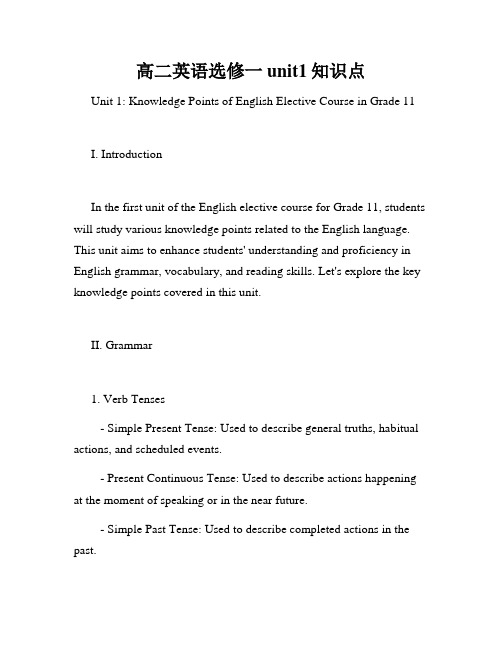
高二英语选修一unit1知识点Unit 1: Knowledge Points of English Elective Course in Grade 11I. IntroductionIn the first unit of the English elective course for Grade 11, students will study various knowledge points related to the English language. This unit aims to enhance students' understanding and proficiency in English grammar, vocabulary, and reading skills. Let's explore the key knowledge points covered in this unit.II. Grammar1. Verb Tenses- Simple Present Tense: Used to describe general truths, habitual actions, and scheduled events.- Present Continuous Tense: Used to describe actions happening at the moment of speaking or in the near future.- Simple Past Tense: Used to describe completed actions in the past.- Past Continuous Tense: Used to describe actions in progress at a specific time in the past.2. Modal Verbs- Can: Used to express ability, permission, and possibility.- Could: Used to express past ability or polite requests.- May: Used to seek permission or express possibility.- Might: Used to express slight possibility or uncertainty.- Must: Used to express obligation or strong belief.- Should: Used to give advice or express recommendation.III. Vocabulary1. Word Formation and Word Families- Prefixes: Un-, dis-, in-, etc.- Suffixes: -ful, -less, -able, etc.- Roots: Base words that form the core of a term.2. Collocations- Words that naturally go together and form common phrases, such as "make a decision," "take a risk," and "run a business."3. Synonyms, Antonyms, and Homonyms- Synonyms: Words with similar meanings.- Antonyms: Words with opposite meanings.- Homonyms: Words that sound the same but have different meanings, such as "write" and "right."IV. Reading Skills1. Skimming and Scanning- Skimming: Quickly reading a text to get a general idea of its content.- Scanning: Rapidly searching for specific information within a text.2. Understanding Contextual Clues- Using surrounding words and information to determine the meaning of unknown words or phrases.3. Identifying Main Ideas and Supporting Details- Recognizing the primary message and the information that supports it.V. ConclusionThe knowledge points covered in Unit 1 of the Grade 11 English elective course provide students with a solid foundation in grammar, vocabulary, and reading skills. By mastering these elements, students will enhance their overall English language proficiency, enabling them to communicate effectively and understand English texts with ease. It is essential to practice and review these knowledge points regularly to reinforce learning and achieve success in English.。
高二英语 Unit 1 Grammar 虚拟语气知识精讲 新人教版选修6
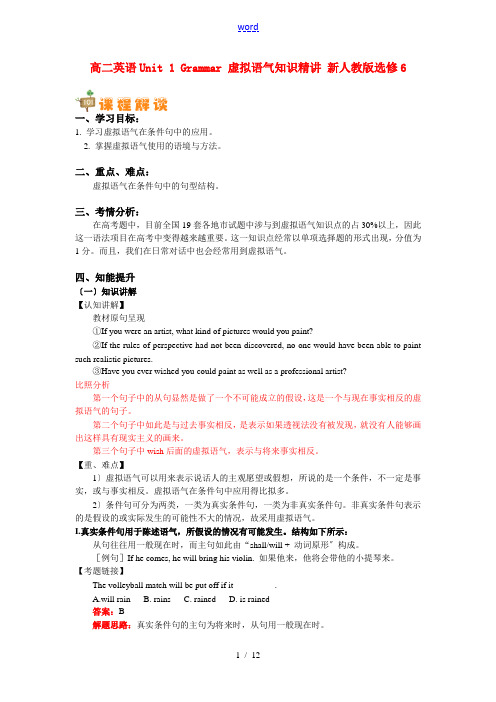
高二英语Unit 1 Grammar 虚拟语气知识精讲新人教版选修6一、学习目标:1. 学习虚拟语气在条件句中的应用。
2. 掌握虚拟语气使用的语境与方法。
二、重点、难点:虚拟语气在条件句中的句型结构。
三、考情分析:在高考题中,目前全国19套各地市试题中涉与到虚拟语气知识点的占30%以上,因此这一语法项目在高考中变得越来越重要。
这一知识点经常以单项选择题的形式出现,分值为1分。
而且,我们在日常对话中也会经常用到虚拟语气。
四、知能提升〔一〕知识讲解【认知讲解】教材原句呈现①If you were an artist, what kind of pictures would you paint?②If the rules of perspective had not been discovered, no one would have been able to paint such realistic pictures.③Have you ever wished you could paint as well as a professional artist?比照分析第一个句子中的从句显然是做了一个不可能成立的假设,这是一个与现在事实相反的虚拟语气的句子。
第二个句子中如此是与过去事实相反,是表示如果透视法没有被发现,就没有人能够画出这样具有现实主义的画来。
第三个句子中wish后面的虚拟语气,表示与将来事实相反。
【重、难点】1〕虚拟语气可以用来表示说话人的主观愿望或假想,所说的是一个条件,不一定是事实,或与事实相反。
虚拟语气在条件句中应用得比拟多。
2〕条件句可分为两类,一类为真实条件句,一类为非真实条件句。
非真实条件句表示的是假设的或实际发生的可能性不大的情况,故采用虚拟语气。
I.真实条件句用于陈述语气,所假设的情况有可能发生。
结构如下所示:从句往往用一般现在时,而主句如此由“shall/will + 动词原形〞构成。
外研版高二英语选择性必修第一册(2019版)_Unit1_单元重难点精讲
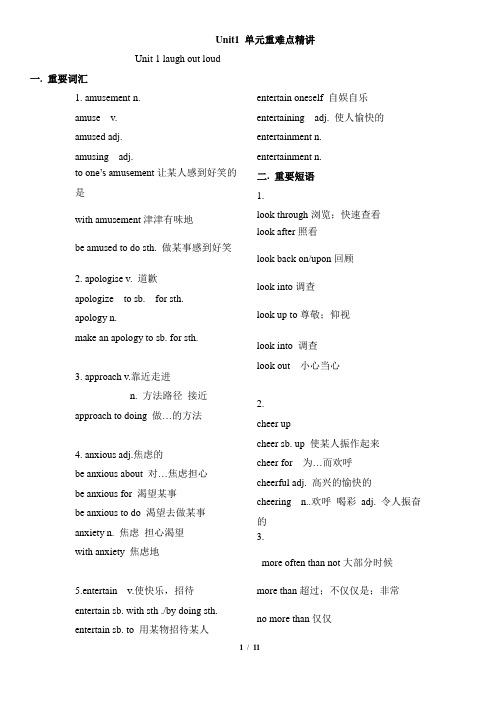
Unit1 单元重难点精讲Unit 1 laugh out loud一. 重要词汇1. amusement n.amuse v.amused adj.amusing adj.to one’s amusement让某人感到好笑的是with amusement津津有味地be amused to do sth. 做某事感到好笑2. apologise v. 道歉apologize to sb. for sth.apology n.make an apology to sb. for sth.3. approach v.靠近走进n. 方法路径接近approach to doing 做…的方法4. anxious adj.焦虑的be anxious about 对…焦虑担心be anxious for 渴望某事be anxious to do 渴望去做某事anxiety n. 焦虑担心渴望with anxiety 焦虑地5.entertain v.使快乐,招待entertain sb. with sth ./by doing sth. entertain sb. to 用某物招待某人entertain oneself 自娱自乐entertaining adj. 使人愉快的entertainment n.entertainment n.二. 重要短语1.look through浏览;快速查看look after照看look back on/upon回顾look into调查look up to尊敬;仰视look into 调查look out 小心当心2.cheer upcheer sb. up 使某人振作起来cheer for 为…而欢呼cheerful adj. 高兴的愉快的cheering n..欢呼喝彩adj. 令人振奋的3.more often than not大部分时候more than超过;不仅仅是;非常no more than仅仅not more than不多于……4.do the trick奏效;达到预期效果play a trick on sb. 捉弄某人trick sb. into doing sth. 欺骗某人做某事5.concentrate on /uponc oncentrate one’s mind/efforts/energy/attention on7.in turn转而,反过来;依次in return作为回报turn around转身;好转turn down调小;拒绝turn into变成turn off关闭turn out证明;结果是in turn 依次轮流in return作为回报in effect 有效地in order 按顺序in danger 处于危险中in reality /fact 事实上in advance 提前6.take off脱下,摘下;起飞;休假;开始走红take apart拆开take down记下take in吸收;理解;欺骗take on呈现;接收take over接管7.after all毕竟,终究,不管怎么说all in all总而言之in all总共;共计at all根本;全然(常用于否定句、条件句中加强语气)not at all 一点也不above all首先;最重要的是first of all首先8.in need of需要常见的“in +n.+of”短语还有:in case of万一in place of代替in spite of尽管in advance of在……前面in charge of主管……9.make sense 有意义有道理讲得通make no sense 没意义没道理讲不通make sense of 弄明白…10.put up 举起张贴建起提高putdown 放下记下长牙put out 扑灭公布put on 上演穿上put off 推迟延期put away 收起攒钱put aside 存储忽视put forward 提出提议put up with容忍忍受三.经典句式1.People sit uncomfortably on plastic chairs,looking through old magazines,all of which have been read hundreds of times previously.[自主翻译]_________________________________________________________________________________2.I speak with the on-duty nurse,who tells me that Lara’s parents rushed her to the hospital after she fell off her bicycle.[自主翻译]_________________________________________________________________________________3.Although it’s doctors and nurses who will treat her injury,it’s my job to make her feel better.[自主翻译]_________________________________________________________________________________4.Being a clown doctor means I can help people by entertaining them.[自主翻译]_________________________________________________________________________________5. We have to be very sensitive and work closely with the doctors and nurses,who keep us updated on each patient.[自主翻译]_________________________________________________________________________________6.While the doctor concentrates on examining Lara’s ankle.,I get her attention by doing a magic trick.[自主翻译]_________________________________________________________________________________7.Although she is clearly still in some pain,her scared and anxious look has been replaced—first by a small smile,and then by loud laughter as I “magically” produce her sock f rom out of my pocket.[自主翻译]_________________________________________________________________________________8.While there might be more hospital visits ahead for Lara and others,I hope that clown doctors help make it a friendlier place to visit.[自主翻译]_________________________________________________________________________________Unit 1 Using language & Developing ideas1.advertise v. advertise for 登广告招聘…advertisement n. put on advertisement 登广告2.employer n.employ v.employee n.3.essentialit is essential for sb. to do sth. It is essential that …4.impress v.impress sb. with sth.impress sth. on sb.be impressed by /with/at 对…印象深刻impression n.make/give/ leave an impression onhave/get a good impression of...对……有一个好印象impressive adj.5.deserve v.应得,应受到deserve to do sth. 应该做某事deserve doing/deserve to be done ……值得被做deserved adj.应得的deserving adj.值得帮助的6.interaction n.交流;互动interaction with...和……的互动interact vi.相互交流;相互影响interact with...与……交流/相互作用7.spot v. vt.发现,认出;点缀spot sb. doing sth. 发现某人正在做某事be spotted with...满是……的斑点spot n.斑点污点地点处所on the spot =on she scene 当场当下a historical spot 一个历史古迹put sb. on the spot使某人难堪8.whisper v.悄声说,低语n.低语;耳语whisper to sb. 与某人耳语It is/was whispered that...据秘密传闻……in a whisper=in whispers耳语地,低声地9.cruel adj. cruelty n.10.conclude v.conclude …with …conclude sth. from sth.….conclusion n.draw/reach/come to/arrive at a conclusion得出结论in conclusion 总之最后make a conclusion下结论jump to a conclusion草率下结论11.sensitive adj. 敏感的易受伤害的灵敏的be sensitive to 对..敏感sensible adj. 明智的,意识到的12.combine v. 结合,联合combine sth. with sth.把…与…结合起来be combined with 与…结合combination n. a combination with 一种…的结合物13.response n.反应回答回复in response to 作为对…的回复/反应make a response to 对…做出反应respond v. 回答相应respond to 回答…14.argue v.argue with sb. on/about/over sth.argue for /againstargue sb. into /out of doing 说服某人做/不做argument n.15.Intend v.intend to dointend sb. to dobe intended for 旨在,为..打算intention n.16.involve v. 包含涉及加入involve doing sth. 包含做某事involve sb. in doing sth. 使某人参与做…involved adj. 有关联的be involved in 被卷入,参加,与…有关二.重要短语1.tell off斥责,责骂tell a lie/lies说谎to tell (you) the truth说实话tell against sb. 对……不利tell on sb. 告发某人2.fall behind没能按时完成(工作);落在后面fall apart散架;瓦解fall down跌倒;倒塌fall off从……掉下fall over被……绊倒;倒下3.. long face 愁眉苦脸ughing stock 笑料,笑柄5.crack a smile 笑了起来6.brand of humour 某种类型的幽默7.put sb. on the spot (故意提出难以回答或尴尬的问题)使某人难堪8.tell off 斥责,责骂9. fall behind 不能按时完成(工作)10.take away 拿走11.make sense 讲得通,有意义12.put up 搭起;张贴13.look up 向上看14.in particular 尤其,特别15.due to 因为16.throw light on 使……明白17. cross out 删掉18.keep up 保持;继续经典句式1. Once,having been intived to dinner at a university,he was put on the spot when the president suddenlyasked him to give a speech.[自主翻译]_________________________________________________________________________________2.All you have to do is cross out the wrong words.[自主翻译]_________________________________________________________________________________3. “What did you say to my animals?” said the emperor,astonished .[自主翻译]_________________________________________________________________________________Unit1. Grammer ------attributive clause1.I walk through the doors into the waiting area,where there’s a familiar atmosphere of boredom and tension.2.People sit uncomfortably on plastic chairs,looking through old magazines,all of which have been read hundreds of times previously.3.I speak with the on-duty nurse,who tells me that Lara’s parents rushed her to the hospital after she fell off her bicycle.4.Scientific studies show that laughter produces chemicals to make people feel better,which means clown doctors can be helpful.非限制性定语从句是对主句中的先行词起作用的定语从句。
Unit 1 Grammar 表语从句讲义-高中英语人教版选择性必修第二册
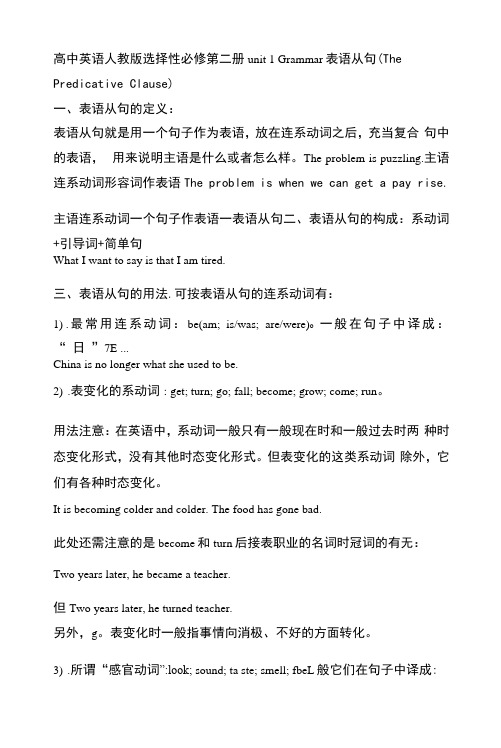
高中英语人教版选择性必修第二册unit 1 Grammar表语从句(ThePredicative Clause)一、表语从句的定义:表语从句就是用一个句子作为表语,放在连系动词之后,充当复合句中的表语,用来说明主语是什么或者怎么样。
The problem is puzzling.主语连系动词形容词作表语The problem is when we can get a pay rise. 主语连系动词一个句子作表语一表语从句二、表语从句的构成:系动词+引导词+简单句What I want to say is that I am tired.三、表语从句的用法.可按表语从句的连系动词有:1).最常用连系动词:be(am; is/was; are/were)o一般在句子中译成:“ 日”7E ...China is no longer what she used to be.2).表变化的系动词:get; turn; go; fall; become; grow; come; run。
用法注意:在英语中,系动词一般只有一般现在时和一般过去时两种时态变化形式,没有其他时态变化形式。
但表变化的这类系动词除外,它们有各种时态变化。
It is becoming colder and colder. The food has gone bad.此处还需注意的是become和turn后接表职业的名词时冠词的有无:Two years later, he became a teacher.但Two years later, he turned teacher.另外,g。
表变化时一般指事情向消极、不好的方面转化。
3).所谓“感官动词”:look; sound; ta ste; smell; fbeL般它们在句子中译成:“・・・起来; ...上去”。
此类系动词为高考高频词。
The food tasted good.食物尝起来很香。
外研版高二英语选择性必修第一册(2019版)_Unit1_同步知识细解码

Unit1 同步知识细解码1.amuse vt.娱乐,消遣;使发笑→amusing adj. (令人感到)有趣的,逗人笑的→amusement n.娱乐;消遣2.entertain v.使快乐→entertaining adj. 有趣的;娱乐性的;令人愉快的→entertainment n. 娱乐,消遣3.examine v. 检查(身体)→examination n. 检查;考试4.advertise v.征聘,公布→advertiser n. 广告商→advertisement n.广告5.employ vt.雇佣;使用→employer n.雇用者,雇主→employee n.雇员→employment n.雇佣examine vt.检查(身体);调查;考试;仔细观察①It is necessary to examine how the proposals can be carried out.调查②The doctor examined her carefully. 检查③The teacher will examine the students in English.考试④He went to the Congo to examine a new volcano.仔细观察Words And Phrases知识要点1mood n.心情,情绪;气氛(教材P1)Lift the mood with a joke and explore the area.用一个笑话提升情绪,探索这个地区。
[例1]The mood of the meeting was distinctly pessimistic.这次会议的气氛显然很悲观。
[例2]She was very tired,and in no mood for dancing.她累极了,无心跳舞。
[知识拓展]be in a good mood心情不错be in a bad mood 情绪不好be in the mood for sth./to do sth. 有心情做某事be in no mood for sth./to do sth. 没心情做某事①He is in a good mood this morning.②We really felt in the mood for a party.③Are you in the mood to go(go) for a ride?知识要点2amusement n.消遣,娱乐;娱乐活动,娱乐用品(教材P2)an amusement park一个娱乐场所[例1]He is responsible for the amusement activity.他负责娱乐活动。
高二英语Unit1单词讲解

高二英语Unit1单词讲解1. genius n. pl: geniuses or genii天才,制造力/U/ a man of genius 才子天才人物 /C/ Shakerspear is a genius天赋,天才 常用单数:have a ⎪⎩⎪⎨⎧talent genius gift for⎩⎨⎧..sth doing sth eg. He has a ~ for music.2. inspiration /U/ ~ to do 灵感 the ~ to paint/C/ ~ to/ for sb 有灵感的人/物My father is an ~ to all of us.v. inspire a so-called-inspired poet.(1)~ sb to sth/ to do sth.The scenery ~ him to write his greatest poetry.(2)~ sb with sth/ ~ sth in sbThe story ~d us with much confidenceThe ~ much confidence in us.3. undertake v. ~ a mission/ task/ project(1) undertake to do sth.同意承诺做He undertook to finish the job by Friday.(2) to take up (a position)担任职务He ~ the leadership of the team.(3) 从事,进行We can ~ the work for the time being.临时我们能够着手做这项工作。
(4) ~ that 保证I can’t ~ that you’ll make a profit.4. analysis pl: analysesn. in the final (last)~ 归根到底vt. analyseanalyse the causes of success and failure.5. obvious adv ~ly n. obviousnessIt’s obvious that …… It’s obvious to everyone that the child has been badly treated.6. within ⎩⎨⎧of out reach s one '~ 7. curious adj(1) 好奇的 be ~ about sth (the origin of mankind)be ~ to do sth.I’m curious to know what she said.(2) 奇数的,不平常的It’s curious that he didn’t tell you.She looks rather curious with green hair.n. curiosity.She gave in to curiosity and opened the letter addressed to her sister. 她抑制不住好奇心拆了妹妹的信。
Unit+1+Grammar+in+Use+教案 高二英语上外版(2020)选择性必修第一册
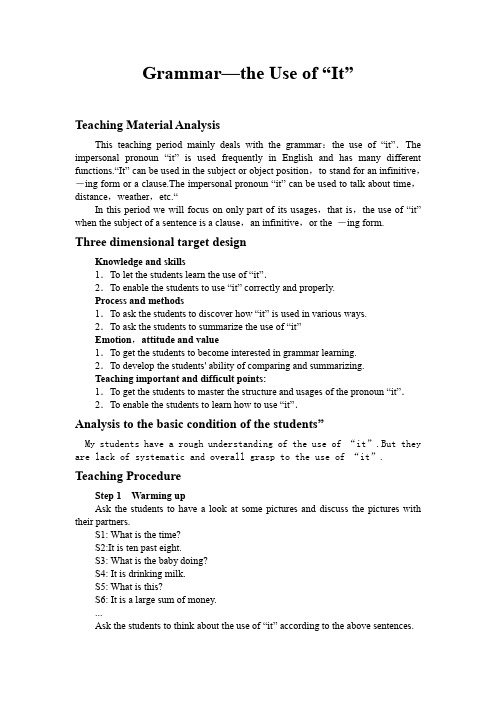
Grammar—the Use of “It”Teaching Material AnalysisThis teaching period mainly deals with the grammar:the use of “it”.The impersonal pronoun “it” is used frequently in English and has many different functions.“It” can be used in the subject or object position,to stand for an infinitive,-ing form or a clause.The impersonal pronoun “it” can be used to talk about time,distance,weather,etc.“In this period we will focus on only part of its usages,that is,the use of “it” when the subject of a sentence is a clause,an infinitive,or the -ing form.Three dimensional target designKnowledge and skills1.To let the students learn the use of “it”.2.To enable the students to use “it” correctly and properly.Process and methods1.To ask the students to discover how “it” is used in various ways.2.To ask the students to summarize the use of “it”Emotion,attitude and value1.To get the students to become interested in grammar learning.2.To develop the students' ability of comparing and summarizing.Teaching important and difficult points:1.To get the students to master the structure and usages of the pronoun “it”.2.To enable the students to learn how to use “it”.Analysis to the basic condition of the students”My students have a rough understanding of the use of “it”.But they are lack of systematic and overall grasp to the use of “it”.Teaching ProcedureStep 1Warming upAsk the students to have a look at some pictures and discuss the pictures with their partners.S1: What is the time?S2:It is ten past eight.S3: What is the baby doing?S4: It is drinking milk.S5: What is this?S6: It is a large sum of money....Ask the students to think about the use of “it” according to the above sentences.Step 2Grammar learningAsk the students to study the following sentences and try to summarize the structure and usages of“it”.1.The personal pronoun “it” and the impersonal pronoun “it”.(1) -What do you think of the cartoon?-It’s interesting/funny.(2) It is said that he is the most handsome boy,but is it true?(3) It rains heavily.(4). It is 20 kilometers from Granddad'shouse to James’.(5). It is November 11, 2005.(6). It is 9 o’clock at night.(7).It‘s quiet here.2.“It” is used in the subject position.1).It's no use cheating in the test .2).It`s reported that Wang Lihong got married.3).It is difficult to quit smoking.It is/was+_n._或p.p.___或_adj.__+ _v-ing_____________.It is/was+_n._或_p.p__或_adj.__+ ___that-clause__________.It is/was+_n._或_p.p__或_adj.__+ to do sth(1) It is +名词+that-从句/ to doIt is___a shame_____that可耻的是......It is__a pity________that 可惜的是......It is ____an honor______that光荣的是......(2) It is +adj. +that-从句/to doIt is _natural______ that …......是自然的It is___clear____ that ......是清楚的It is__necessary__that ......是有必要的(3) It is +p.p. +that-从句It is __reported__that …据报道......It is ___said___that... 据说......It is __suggested_____ that 据建议......Step 3 Summing upTry to help the students draw the following conclusions.1.“It” is a very useful word and can be used in many ways.2.The personal pronoun “it” can substitute something that is mentioned before.In some certain situations,“it” can stand for an u nidentified person or a baby.3.The impersonal pronoun “it” can be used to talk about time,distance,weather,etc.4.“It” can act as a subject,while the real subject or object can be put backwards in the form of an infinitive,-ing form or a clause.Step 4 Grammar practiceAsk students to do the following excises:1.Rewrite the sentences using “it” structures given.(1)Giving up smoking is difficult.(It is...)(2)Most people believe smoking causes cancer.(It is believed...)(3)That you can’t go with us is a pity. (It is a pity...)(4)Don't quit on a stressful day.(It's no use...)Suggested answers:(1)It is difficult to give up smoking.(2)It is believed that smoking causes cancer.(3) It is a pity that you can’t go with us.(4)It is no use trying to quit on a stressful day.Teaching ReflectionIn the context, the students had a more vivid and deep understanding to the use of “it”. So we should always bear in mind that we must get students learn language-related knowledge in context.We should not separate it from the context.。
- 1、下载文档前请自行甄别文档内容的完整性,平台不提供额外的编辑、内容补充、找答案等附加服务。
- 2、"仅部分预览"的文档,不可在线预览部分如存在完整性等问题,可反馈申请退款(可完整预览的文档不适用该条件!)。
- 3、如文档侵犯您的权益,请联系客服反馈,我们会尽快为您处理(人工客服工作时间:9:00-18:30)。
• One day, your doctor tells you that you have an incurable disease and may not have more than twelve months to live. attribute
• There did not seem much point in working on my PhD -- I did not expect to survive tto have met his friend.
(1)作主语 To finish the work in ten minutes is very hard.
To lose your heart means failure.
动词不定式短语作主语时,常用it作形式主语, 例如上面两句可用如下形式:
He got the car to start.
(5)作定语:
动词不定式作定语,与所修饰名词有如下关系: ①动宾关系: I have a meeting to attend. 不定式为不及物动词时,应用介词
He found a good house to live in. The child has nothing to worry about. 但不定式所修饰的名词如果是time,place,way时,不 定式后面的介词习惯上省去。
object
Exercise
D his mistake. 1. The boy finally was beginning _____ A. the he saw C. seeing B. for him to see D. to see
2.When the teacher came in, the children pretended____ D attentively A. reading B. to be read C. being reading D. to be reading C 3. Will you lend me a book ____? A. to be read B. for reading C. to read D. I read
(3)作宾语: 常与不定式做宾语连用的动词有: agree,ask, beg ,choose,expect, fail, help, hope, learn manage, offer, plan, pretend, promise, prefer, refuse, want, wish
如果不定式(宾语)后面有宾语补足语,则用it 作形式宾语,真正的宾语(不定式)后置,放在宾 语补足语后面 Marx found it important to study the situation in Russia.
动词不定式也可充当介词宾语 I have no choice but to stay here. He did nothing last Sunday but repair his bike. There is nothing to do but wait.
动词不定式与疑问词连用作宾语 He gave us some advice on how to learn English.
find , feel, consider, think, make + it + adj./n+to do
I find it possible to ask the question
(4)作宾语补足语:
want, wish, ask, tell, order, beg, permit, help, advise, persuade, allow, prepare, cause, force, call on, wait for, invite.
(2)作表语
Her job is to clean the hall.
He appears to have caught a cold. 作表语的不定式带to与不带to。作表语的不定 式通常带to,当主语部分含有实义动词do, 不定式作表语可省to。 The only thing I can do is (to)wait.
• People who listen to Hawking’s lectures sometimes find it difficult to understand him, because his thoughts and ideas often seem as large as the universe he is trying to describe.
• In the book, Hawking explains both what it means to be a scientist and how science works. subject
• Scientists look at the world and try to describe and explain what they see.
He had no place to live ( in ).
如果句子的主语是不定式的执行者,不定式用主动。 如果句子的主语不是不定式的执行者,不定式用被动。 Have you got anything to send? 你有什么东西要寄吗?
“Have you got anything to be sent?” said the secretary.
• 带“to”的短语不一定都是动词不 定式,比如 according to, stick to, listen to, pay attention to, lead to, look forward to, get down to,object to, stick to,be used to 等。“ to” 在上述短语中 作介词,后接名词,代词或动名 词。
有些动词如
make, let, have, see, find,watch,observe,notice, listen to, hear, feel 与不带to的不定式连用,但 改为被动语态时,不定式要加to
I saw him cross the road.
He was seen to cross the road. get sth/sb. to do
We plan to pay a visit. He seems to know a lot. The meeting to be held tomorrow is put off. The teacher ordered the work to be done. To catch the first bus, he got up early.
动词不定式
1.不定式的形式:(以动词do为例)
主动
一般式 to do
被动
to be done
进行式
完成式
to be doing
to have done to have been done
否定式:not + to do
(1)一般式:所表示的动作与谓语动词动作同时发 生或发生在谓语动词动作之后
To teach English is my job.
object
• To explain what they have seen, they build a theory about the way in which things happen and the causes and effects.
adverbial
• But if, like Hawking, they are studying something that is too large or too difficult to observe directly, they will use a model to test the theory. adverbial
②表结果:
He arrived late to find the train gone.
I visited him only to find him out.
④表程度: It's too dark for us to see anything. The question is simple for him to answer.
C “I’m poor!” 4.To go to the ball with just a flower is ____
A. say B. saying C. to say D. to saying
你有什么要(我或别人)寄的东西吗?
②说明所修饰名词的内容: We have made a plan to finish the work.
③被修饰名词是不定式逻辑主语:
He is the first to get here.
(6)作状语:
①表目的: He worked day and night to get the money. She sold her hair to buy the watch chain.
• But in order to get married, I needed a job, and in order to get a job, I needed a PhD. adverbial
• He continued his exploration of the universe and traveled around the world to give lectures. adverbial
• Since then, Hawking has continued to seek answer to questions about the nature of the universe. object
• Readers were pleased and surprised to find that a scientist could write about his work in a way that ordinary people could understand. adverbial
